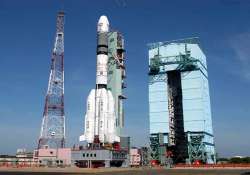June rocket launch delay not to affect India's other 2013 probes
Chennai, June 6: Even though the June 12 rocket launch has been put off to June-end or the first week of July because of the failure of a component, Indian space agency officials do not

Chennai, June 6: Even though the June 12 rocket launch has been put off to June-end or the first week of July because of the failure of a component, Indian space agency officials do not expect this setback to impact other rocket launch plans.
Even the ambitious Mars mission planned this year would not be affected, officials said.
"We have sufficient time between the launches and we are confident of closing 2013 with five launches. One rocket launch (carrying Saral satellite) is already over in February. So, only four remain," a senior official at the Indian Space Research Organisation (ISRO) told IANS, seeking anonymity.
ISRO had planned to launch its first regional navigation satellite (IRNSS-1A) on its Polar Satellite Launch Vehicle-XL (PSLV-XL) variant June 12, but had to put it off after finding a problem in one of the electro-hydraulic control actuators in the second stage/engine.
The rocket was fully assembled with the satellite when the problem was detected, during checks.
"The second stage had to be dismantled to replace the actuator which is an assembly of several components. It weighs around 20 kg. We have replaced the component and tests are on," said an ISRO official.
Incidentally, in February 2011, a gas motor in the second stage control actuators did not perform as per expectations and had to be replaced, delaying PSLV's flight carrying Resourcesat-2, an earth observation satellite, and two other payloads, by nearly a month.
However, ISRO officials do not think that there is a problem in the quality of components as one or two in a batch may fail.
The navigational satellite is intended to provide terrestrial, aerial and marine navigation services and help in disaster and fleet management across the region.
Following the PSLV-XL launch, ISRO is planning to launch its communication satellite G-Sat 14 using heavier rocket - Geosynchronous Satellite Launch Vehicle (GSLV) - powered with a domestic cryogenic engine some time in August this year.
Preparatory work for the G-Sat 14 launch is going ahead at the rocket launch pad in Sriharikota in Andhra Pradesh, around 80 km from here.
These two launches will be followed by the mission to Mars later this year. The launch of one more remote sensing satellite is also being planned before the end of the year.
Even the ambitious Mars mission planned this year would not be affected, officials said.
"We have sufficient time between the launches and we are confident of closing 2013 with five launches. One rocket launch (carrying Saral satellite) is already over in February. So, only four remain," a senior official at the Indian Space Research Organisation (ISRO) told IANS, seeking anonymity.
ISRO had planned to launch its first regional navigation satellite (IRNSS-1A) on its Polar Satellite Launch Vehicle-XL (PSLV-XL) variant June 12, but had to put it off after finding a problem in one of the electro-hydraulic control actuators in the second stage/engine.
The rocket was fully assembled with the satellite when the problem was detected, during checks.
"The second stage had to be dismantled to replace the actuator which is an assembly of several components. It weighs around 20 kg. We have replaced the component and tests are on," said an ISRO official.
Incidentally, in February 2011, a gas motor in the second stage control actuators did not perform as per expectations and had to be replaced, delaying PSLV's flight carrying Resourcesat-2, an earth observation satellite, and two other payloads, by nearly a month.
However, ISRO officials do not think that there is a problem in the quality of components as one or two in a batch may fail.
The navigational satellite is intended to provide terrestrial, aerial and marine navigation services and help in disaster and fleet management across the region.
Following the PSLV-XL launch, ISRO is planning to launch its communication satellite G-Sat 14 using heavier rocket - Geosynchronous Satellite Launch Vehicle (GSLV) - powered with a domestic cryogenic engine some time in August this year.
Preparatory work for the G-Sat 14 launch is going ahead at the rocket launch pad in Sriharikota in Andhra Pradesh, around 80 km from here.
These two launches will be followed by the mission to Mars later this year. The launch of one more remote sensing satellite is also being planned before the end of the year.